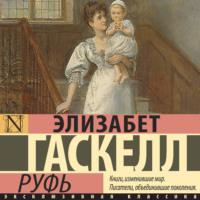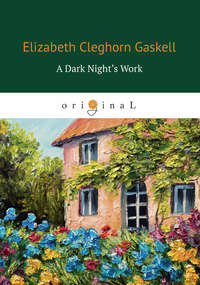
Полная версия
Ruth
Near this comfortable, quiet, unfrequented inn, there was another pond, for household and farm-yard purposes, from which the cattle were drinking, before returning to the fields after they had been milked. Their very motions were so lazy and slow, that they served to fill up the mind with the sensation of dreamy rest. Ruth and Mr Bellingham plunged through the broken ground to regain the road near the wayside inn. Hand-in-hand, now pricked by the far-spreading gorse, now ankle-deep in sand; now pressing the soft, thick heath, which should make so brave an autumn show; and now over wild thyme and other fragrant herbs, they made their way, with many a merry laugh. Once on the road, at the summit, Ruth stood silent, in breathless delight at the view before her. The hill fell suddenly down into the plain, extending for a dozen miles or more. There was a clump of dark Scotch firs close to them, which cut clear against the western sky, and threw back the nearest levels into distance. The plain below them was richly wooded, and was tinted by the young tender hues of the earliest summer, for all the trees of the wood had donned their leaves except the cautious ash, which here and there gave a soft, pleasant greyness to the landscape. Far away in the champaign were spires, and towers, and stacks of chimneys belonging to some distant hidden farm-house, which were traced downwards through the golden air by the thin columns of blue smoke sent up from the evening fires. The view was bounded by some rising ground in deep purple shadow against the sunset sky.
When first they stopped, silent with sighing pleasure, the air seemed full of pleasant noises; distant church-bells made harmonious music with the little singing-birds near at hand; nor were the lowings of the cattle, nor the calls of the farm-servants discordant, for the voices seemed to be hushed by the brooding consciousness of the Sabbath. They stood loitering before the house, quietly enjoying the view. The clock in the little inn struck eight, and it sounded clear and sharp in the stillness.
"Can it be so late?" asked Ruth.
"I should not have thought it possible," answered Mr Bellingham. "But, never mind, you will be at home long before nine. Stay, there is a shorter road, I know, through the fields; just wait a moment, while I go in and ask the exact way." He dropped Ruth's arm, and went into the public-house.
A gig had been slowly toiling up the sandy hill behind, unperceived by the young couple, and now it reached the table-land, and was close upon them as they separated. Ruth turned round, when the sound of the horse's footsteps came distinctly as he reached the level. She faced Mrs Mason!
They were not ten – no, not five yards apart. At the same moment they recognised each other, and, what was worse, Mrs Mason had clearly seen, with her sharp, needle-like eyes, the attitude in which Ruth had stood with the young man who had just quitted her. Ruth's hand had been lying in his arm, and fondly held there by his other hand.
Mrs Mason was careless about the circumstances of temptation into which the girls entrusted to her as apprentices were thrown, but severely intolerant if their conduct was in any degree influenced by the force of these temptations. She called this intolerance "keeping up the character of her establishment." It would have been a better and more Christian thing, if she had kept up the character of her girls by tender vigilance and maternal care.
This evening, too, she was in an irritated state of temper. Her brother had undertaken to drive her round by Henbury, in order to give her the unpleasant information of the misbehaviour of her eldest son, who was an assistant in a draper's shop in a neighbouring town. She was full of indignation against want of steadiness, though not willing to direct her indignation against the right object – her ne'er-do-well darling. While she was thus charged with anger (for her brother justly defended her son's master and companions from her attacks), she saw Ruth standing with a lover, far away from home, at such a time in the evening, and she boiled over with intemperate displeasure.
"Come here directly, Miss Hilton," she exclaimed, sharply. Then, dropping her voice to low, bitter tones of concentrated wrath, she said to the trembling, guilty Ruth:
"Don't attempt to show your face at my house again after this conduct. I saw you, and your spark, too. I'll have no slurs on the character of my apprentices. Don't say a word. I saw enough. I shall write and tell your guardian to-morrow."
The horse started away, for he was impatient to be off, and Ruth was left standing there, stony, sick, and pale, as if the lightning had torn up the ground beneath her feet. She could not go on standing, she was so sick and faint; she staggered back to the broken sand-bank, and sank down, and covered her face with her hands.
"My dearest Ruth! are you ill? Speak, darling! My love, my love, do speak to me!"
What tender words after such harsh ones! They loosened the fountain of Ruth's tears, and she cried bitterly.
"Oh! did you see her – did you hear what she said?"
"She! Who, my darling? Don't sob so, Ruth; tell me what it is. Who has been near you? – who has been speaking to you to make you cry so?"
"Oh, Mrs Mason." And there was a fresh burst of sorrow.
"You don't say so! are you sure? I was not away five minutes."
"Oh, yes, sir, I'm quite sure. She was so angry; she said I must never show my face there again. Oh, dear! what shall I do?"
It seemed to the poor child as if Mrs Mason's words were irrevocable, and, that being so, she was shut out from every house. She saw how much she had done that was deserving of blame, now when it was too late to undo it. She knew with what severity and taunts Mrs Mason had often treated her for involuntary failings, of which she had been quite unconscious; and now she had really done wrong, and shrank with terror from the consequences. Her eyes were so blinded by the fast-falling tears, she did not see (nor had she seen would she have been able to interpret) the change in Mr Bellingham's countenance, as he stood silently watching her. He was silent so long, that even in her sorrow she began to wonder that he did not speak, and to wish to hear his soothing words once more.
"It is very unfortunate," he began, at last; and then he stopped; then he began again: "It is very unfortunate; for, you see, I did not like to name it to you before, but, I believe – I have business, in fact, which obliges me to go to town to-morrow – to London, I mean; and I don't know when I shall be able to return."
"To London!" cried Ruth; "are you going away? Oh, Mr Bellingham!" She wept afresh, giving herself up to the desolate feeling of sorrow, which absorbed all the terror she had been experiencing at the idea of Mrs Mason's anger. It seemed to her at this moment as though she could have borne everything but his departure; but she did not speak again; and after two or three minutes had elapsed, he spoke – not in his natural careless voice, but in a sort of constrained, agitated tone.
"I can hardly bear the idea of leaving you, my own Ruth. In such distress, too; for where you can go I do not know at all. From all you have told me of Mrs Mason, I don't think she is likely to mitigate her severity in your case."
No answer, but tears quietly, incessantly flowing. Mrs Mason's displeasure seemed a distant thing; his going away was the present distress. He went on:
"Ruth, would you go with me to London? My darling, I cannot leave you here without a home; the thought of leaving you at all is pain enough, but in these circumstances – so friendless, so homeless – it is impossible. You must come with me, love, and trust to me."
Still she did not speak. Remember how young, and innocent, and motherless she was! It seemed to her as if it would be happiness enough to be with him; and as for the future, he would arrange and decide for that. The future lay wrapped in a golden mist, which she did not care to penetrate; but if he, her sun, was out of sight and gone, the golden mist became dark heavy gloom, through which no hope could come. He took her hand.
"Will you not come with me? Do you not love me enough to trust me? Oh, Ruth," (reproachfully), "can you not trust me?"
She had stopped crying, but was sobbing sadly.
"I cannot bear this, love. Your sorrow is absolute pain to me; but it is worse to feel how indifferent you are – how little you care about our separation."
He dropped her hand. She burst into a fresh fit of crying.
"I may have to join my mother in Paris; I don't know when I shall see you again. Oh, Ruth!" said he, vehemently, "do you love me at all?"
She said something in a very low voice; he could not hear it, though he bent down his head – but he took her hand again.
"What was it you said, love? Was it not that you did love me? My darling, you do! I can tell it by the trembling of this little hand; then you will not suffer me to go away alone and unhappy, most anxious about you? There is no other course open to you; my poor girl has no friends to receive her. I will go home directly, and return in an hour with a carriage. You make me too happy by your silence, Ruth."
"Oh, what can I do!" exclaimed Ruth. "Mr Bellingham, you should help me, and instead of that you only bewilder me."
"How, my dearest Ruth? Bewilder you! It seems so clear to me. Look at the case fairly! Here you are, an orphan, with only one person to love you, poor child! – thrown off, for no fault of yours, by the only creature on whom you have a claim, that creature a tyrannical, inflexible woman; what is more natural (and, being natural, more right) than that you should throw yourself upon the care of the one who loves you dearly – who would go through fire and water for you – who would shelter you from all harm? Unless, indeed, as I suspect, you do not care for him. If so, Ruth! if you do not care for me, we had better part – I will leave you at once; it will be better for me to go, if you do not care for me."
He said this very sadly (it seemed so to Ruth, at least), and made as though he would have drawn his hand from hers, but now she held it with soft force.
"Don't leave me, please, sir. It is very true I have no friend but you. Don't leave me, please. But, oh! do tell me what I must do!"
"Will you do it if I tell you? If you will trust me, I will do my very best for you. I will give you my best advice. You see your position. Mrs Mason writes and gives her own exaggerated account to your guardian; he is bound by no great love to you, from what I have heard you say, and throws you off; I, who might be able to befriend you – through my mother, perhaps – I, who could at least comfort you a little (could not I, Ruth?), am away, far away, for an indefinite time; that is your position at present. Now, what I advise is this. Come with me into this little inn; I will order tea for you – (I am sure you require it sadly) – and I will leave you there, and go home for the carriage. I will return in an hour at the latest. Then we are together, come what may; that is enough for me; is it not for you, Ruth? Say, yes – say it ever so low, but give me the delight of hearing it. Ruth, say yes."
Low and soft, with much hesitation, came the "Yes;" the fatal word of which she so little imagined the infinite consequences. The thought of being with him was all and everything.
"How you tremble, my darling! You are cold, love! Come into the house, and I'll order tea directly and be off."
She rose, and, leaning on his arm, went into the house. She was shaking and dizzy with the agitation of the last hour. He spoke to the civil farmer-landlord, who conducted them into a neat parlour, with windows opening into the garden at the back of the house. They had admitted much of the evening's fragrance through their open casements, before they were hastily closed by the attentive host.
"Tea, directly, for this lady!" The landlord vanished.
"Dearest Ruth, I must go; there is not an instant to be lost; promise me to take some tea, for you are shivering all over, and deadly pale with the fright that abominable woman has given you. I must go; I shall be back in half an hour – and then no more partings, darling."
He kissed her pale cold face, and went away. The room whirled round before Ruth; it was a dream – a strange, varying, shifting dream – with the old home of her childhood for one scene, with the terror of Mrs Mason's unexpected appearance for another; and then, strangest, dizziest, happiest of all, there was the consciousness of his love, who was all the world to her; and the remembrance of the tender words, which still kept up their low soft echo in her heart.
Her head ached so much that she could hardly see; even the dusky twilight was a dazzling glare to her poor eyes; and when the daughter of the house brought in the sharp light of the candles, preparatory for tea, Ruth hid her face in the sofa pillows with a low exclamation of pain.
"Does your head ache, miss?" asked the girl, in a gentle, sympathising voice. "Let me make you some tea, miss, it will do you good. Many's the time poor mother's headaches were cured by good strong tea."
Ruth murmured acquiescence; the young girl (about Ruth's own age, but who was the mistress of the little establishment, owing to her mother's death) made tea, and brought Ruth a cup to the sofa where she lay. Ruth was feverish and thirsty, and eagerly drank it off, although she could not touch the bread and butter which the girl offered her. She felt better and fresher, though she was still faint and weak.
"Thank you," said Ruth. "Don't let me keep you; perhaps you are busy. You have been very kind, and the tea has done me a great deal of good."
The girl left the room. Ruth became as hot as she had previously been cold, and went and opened the window, and leant out into the still, sweet, evening air. The bush of sweetbrier, underneath the window, scented the place, and the delicious fragrance reminded her of her old home. I think scents affect and quicken the memory more than either sights or sounds; for Ruth had instantly before her eyes the little garden beneath the window of her mother's room, with the old man leaning on his stick, watching her, just as he had done, not three hours before, on that very afternoon.
"Dear old Thomas! He and Mary would take me in, I think; they would love me all the more if I were cast off. And Mr Bellingham would, perhaps, not be so very long away; and he would know where to find me if I stayed at Milham Grange. Oh, would it not be better to go to them? I wonder if he would be very sorry! I could not bear to make him sorry, so kind as he has been to me; but I do believe it would be better to go to them, and ask their advice, at any rate. He would follow me there; and I could talk over what I had better do, with the three best friends I have in the world – the only friends I have."
She put on her bonnet, and opened the parlour-door; but then she saw the square figure of the landlord standing at the open house-door, smoking his evening pipe, and looming large and distinct against the dark air and landscape beyond. Ruth remembered the cup of tea that she had drank; it must be paid for, and she had no money with her. She feared that he would not let her quit the house without paying. She thought that she would leave a note for Mr Bellingham, saying where she was gone, and how she had left the house in debt, for (like a child) all dilemmas appeared of equal magnitude to her; and the difficulty of passing the landlord while he stood there, and of giving him an explanation of the circumstances (as far as such explanation was due to him), appeared insuperable, and as awkward, and fraught with inconvenience, as far more serious situations. She kept peeping out of her room, after she had written her little pencil-note, to see if the outer door was still obstructed. There he stood, motionless, enjoying his pipe, and looking out into the darkness which gathered thick with the coming night. The fumes of the tobacco were carried by the air into the house, and brought back Ruth's sick headache. Her energy left her; she became stupid and languid, and incapable of spirited exertion; she modified her plan of action, to the determination of asking Mr Bellingham to take her to Milham Grange, to the care of her humble friends, instead of to London. And she thought, in her simplicity, that he would instantly consent when he had heard her reasons.
She started up. A carriage dashed up to the door. She hushed her beating heart, and tried to stop her throbbing head to listen. She heard him speaking to the landlord, though she could not distinguish what he said; heard the jingling of money, and, in another moment, he was in the room, and had taken her arm to lead her to the carriage.
"Oh, sir! I want you to take me to Milham Grange," said she, holding back. "Old Thomas would give me a home."
"Well, dearest, we'll talk of all that in the carriage; I am sure you will listen to reason. Nay, if you will go to Milham you must go in the carriage," said he, hurriedly. She was little accustomed to oppose the wishes of any one – obedient and docile by nature, and unsuspicious and innocent of any harmful consequences. She entered the carriage, and drove towards London.
Chapter V
In North Wales
The June of 18 – had been glorious and sunny, and full of flowers; but July came in with pouring rain, and it was a gloomy time for travellers and for weather-bound tourists, who lounged away the days in touching up sketches, dressing flies, and reading over again for the twentieth time the few volumes they had brought with them. A number of the Times, five days old, had been in constant demand in all the sitting-rooms of a certain inn in a little mountain village of North Wales, through a long July morning. The valleys around were filled with thick cold mist, which had crept up the hillsides till the hamlet itself was folded in its white dense curtain, and from the inn-windows nothing was seen of the beautiful scenery around. The tourists who thronged the rooms might as well have been "wi' their dear little bairnies at hame;" and so some of them seemed to think, as they stood, with their faces flattened against the window-panes, looking abroad in search of an event to fill up the dreary time. How many dinners were hastened that day, by way of getting through the morning, let the poor Welsh kitchen-maid say! The very village children kept indoors; or if one or two more adventurous stole out into the land of temptation and puddles, they were soon clutched back by angry and busy mothers.
It was only four o'clock, but most of the inmates of the inn thought it must be between six and seven, the morning had seemed so long – so many hours had passed since dinner – when a Welsh car, drawn by two horses, rattled briskly up to the door. Every window of the ark was crowded with faces at the sound; the leathern curtains were undrawn to their curious eyes, and out sprang a gentleman, who carefully assisted a well-cloaked-up lady into the little inn, despite the landlady's assurances of not having a room to spare.
The gentleman (it was Mr Bellingham) paid no attention to the speeches of the hostess, but quietly superintended the unpacking of the carriage, and paid the postillion; then, turning round with his face to the light, he spoke to the landlady, whose voice had been rising during the last five minutes:
"Nay, Jenny, you're strangely altered, if you can turn out an old friend on such an evening as this. If I remember right, Pen trê Voelas is twenty miles across the bleakest mountain road I ever saw."
"Indeed, sir, and I did not know you; Mr Bellingham, I believe. Indeed, sir, Pen trê Voelas is not above eighteen miles – we only charge for eighteen; it may not be much above seventeen; and we're quite full, indeed, more's the pity."
"Well, but Jenny, to oblige me, an old friend, you can find lodgings out for some of your people – the house across, for instance."
"Indeed, sir, and it's at liberty; perhaps you would not mind lodging there yourself; I could get you the best rooms, and send over a trifle or so of furniture, if they wern't as you'd wish them to be."
"No, Jenny! here I stay. You'll not induce me to venture over into those rooms, whose dirt I know of old. Can't you persuade some one who is not an old friend to move across? Say, if you like, that I had written beforehand to bespeak the rooms. Oh! I know you can manage it – I know your good-natured ways."
"Indeed, sir – well! I'll see, if you and the lady will just step into the back parlour, sir – there's no one there just now; the lady is keeping her bed to-day for a cold, and the gentleman is having a rubber at whist in number three. I'll see what I can do."
"Thank you, thank you. Is there a fire? if not, one must be lighted. Come, Ruthie, come."
He led the way into a large, bow-windowed room, which looked gloomy enough that afternoon, but which I have seen bright and buoyant with youth and hope within, and sunny lights creeping down the purple mountain slope, and stealing over the green, soft meadows, till they reached the little garden, full of roses and lavender-bushes, lying close under the window. I have seen – but I shall see no more.
"I did not know you had been here before," said Ruth, as Mr Bellingham helped her off with her cloak.
"Oh, yes; three years ago I was here on a reading party. We were here above two months, attracted by Jenny's kind heart and oddities; but driven away finally by the insufferable dirt. However, for a week or two it won't much signify."
"But can she take us in, sir? I thought I heard her saying her house was full."
"Oh, yes – I dare say it is; but I shall pay her well; she can easily make excuses to some poor devil, and send him over to the other side; and, for a day or two, so that we have shelter, it does not much signify."
"Could not we go to the house on the other side, sir?"
"And have our meals carried across to us in a half-warm state, to say nothing of having no one to scold for bad cooking! You don't know these out-of-the-way Welsh inns yet, Ruthie."
"No! I only thought it seemed rather unfair – " said Ruth, gently; but she did not end her sentence, for Mr Bellingham formed his lips into a whistle, and walked to the window to survey the rain.
The remembrance of his former good payment prompted many little lies of which Mrs Morgan was guilty that afternoon, before she succeeded in turning out a gentleman and lady, who were only planning to remain till the ensuing Saturday at the outside, so, if they did fulfil their threat, and leave on the next day, she would be no very great loser.
These household arrangements complete, she solaced herself with tea in her own little parlour, and shrewdly reviewed the circumstances of Mr Bellingham's arrival.
"Indeed! and she's not his wife," thought Jenny, "that's clear as day. His wife would have brought her maid, and given herself twice as many airs about the sitting-rooms; while this poor miss never spoke, but kept as still as a mouse. Indeed, and young men will be young men; and, as long as their fathers and mothers shut their eyes, it's none of my business to go about asking questions."
In this manner they settled down to a week's enjoyment of that Alpine country. It was most true enjoyment to Ruth. It was opening a new sense; vast ideas of beauty and grandeur filled her mind at the sight of the mountains now first beheld in full majesty. She was almost overpowered by the vague and solemn delight; but by-and-by her love for them equalled her awe, and in the night-time she would softly rise, and steal to the window to see the white moonlight, which gave a new aspect to the everlasting hills that girdle the mountain village.
Their breakfast-hour was late, in accordance with Mr Bellingham's tastes and habits; but Ruth was up betimes, and out and away, brushing the dew-drops from the short crisp grass; the lark sung high above her head, and she knew not if she moved or stood still, for the grandeur of this beautiful earth absorbed all idea of separate and individual existence. Even rain was a pleasure to her. She sat in the window-seat of their parlour (she would have gone out gladly, but that such a proceeding annoyed Mr Bellingham, who usually at such times lounged away the listless hours on a sofa, and relieved himself by abusing the weather); she saw the swift-fleeting showers come athwart the sunlight like a rush of silver arrows; she watched the purple darkness on the heathery mountain-side, and then the pale golden gleam which succeeded. There was no change or alteration of nature that had not its own peculiar beauty in the eyes of Ruth; but if she had complained of the changeable climate, she would have pleased Mr Bellingham more; her admiration and her content made him angry, until her pretty motions and loving eyes soothed down his impatience.









